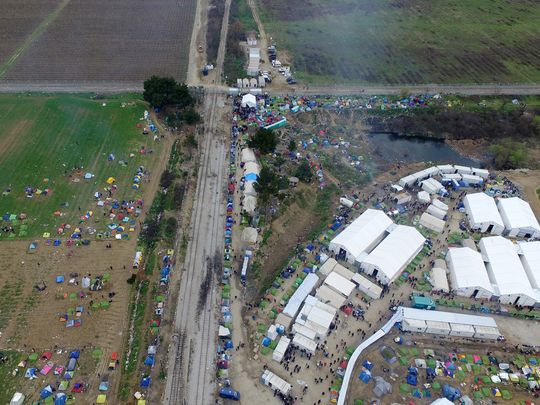Small Greek village copes with thousands of migrants unable to leave

IDOMENI, Greece — Walking past his village's main square, Antonis Zois stares at the Syrian refugee families filling their water bottles at the public fountain.
“The camp is not a place for a human being to live,” said Zois, 85, waving at a young girl in a red polka-dot jacket. “We always had migrants passing through, but I've never seen a situation like this.”
Zois pointed to a makeshift camp that was built for 2,000 refugees waiting to cross into Macedonia but now holds more than 13,000 migrants with nowhere to go because the border crossings to nortern Europe are blocked.
This rural region of northern Greece is traditionally more conservative and nationalistic than the south, and many villagers here don't like having migrants next to their homes.
Tents of refugees and migrants stand next to a refugee camp at the Greek-Macedonian border, near the northern Greek village of Idomeni. (Photo: Eldar Emric, AP)
But with women and children comprising more than half of the migrants, it's difficult for local residents to remain hard-hearted.
“Some of our ancestors were also refugees coming from eastern Thrace in 1922,” said Zois, referring to an area near the Bulgarian and Turkish borders. “It was destroyed a few times in its history, with the last being during the Greek Civil War, when many houses burnt down. So we try to understand.”
Idomeni has fewer than 130 people, mostly older farmers. The school closed 20 years ago because of a lack of children. With no available jobs or much social activity, most residents abandoned this hamlet.
The district of Kilkis, which includes Idomeni hosts 20,000 of the 30,000 migrants stranded in Greece. More than 100,000 migrants are expected to arrive in Greece this month, according to European Union Commissioner for Immigration Dimitris Avramopoulos. That surpasses the district's population of 80,000.
Mayor Christos Goudedoudis told a local radio station that he's worried about the well-being of Idomeni residents if the number of migrants continues to rise. He is also concerned about the migrants' living conditions.
A girl has her hair washed between tents at the Greek-Macedonian border near Idomeni, northern Greece. (Photo: Valdrin Xhemaj, European Pressphoto Agency)
“Some refugees have been sleeping in my fields,” Zois said, glancing at the camp from his porch. “I've sowed my field with my son, but I don't think we'll be making bread this year.”
Across the way, Sakis Papadopoulos opened the trunk of his white truck to display his merchandise — onions, potatoes, razor blades and cutlery. Papadopoulos said selling goods is his only opportunity to make a living — and refugees are his new customers.
Potatoes and onions go for $2 a pound, a bag of salt is 55 cents.
“Nisf euros (1.5 euros), my friend,” Papadopoulos said to a Syrian refugee using the few Arabic words he has learned. The Syrian man bargains hard, while holding his child by the hand.
“OK, OK take it,” Papadopoulos said, giving up. “You have to feed your kid, what can I do?” he continues in Greek without expecting an answer.
Although Papadopoulos is illegally selling goods — often overpriced — he's filling a demand not provided by authorities or aid groups. And in this town hit hard by Greece's severe economic crisis, the migrants offer a chance for residents to earn some money.
Every morning, migrants in the camp are given a sandwich, and in the afternoon they get another one. Tired of the fare, migrants shop at dozens of cars with open trunks selling food and other necessities.
A young refugee comes up and puts 15 euros ($16.50) in Papadopoulos' hand. The vendor smiles but is too busy to talk as a crowd of impatient customers arrive.
“He owed me 15 euros from yesterday," Papadopoulos explained afterward. "I didn't know if I'd ever get the money back. But these people, they don't try to steal from me. They want to bargain but don't accept anything for free.”
Papadopoulos also keeps candy in his pocket for the children. That is free.
Christos Souflis, 53, a government employee who splits his time between Thessaloniki and Idomeni, is a little annoyed by the crowd outside his house, but he says many residents are especially moved by the plight of the children.
Политика конфиденциальности | Правила пользования сайтом








